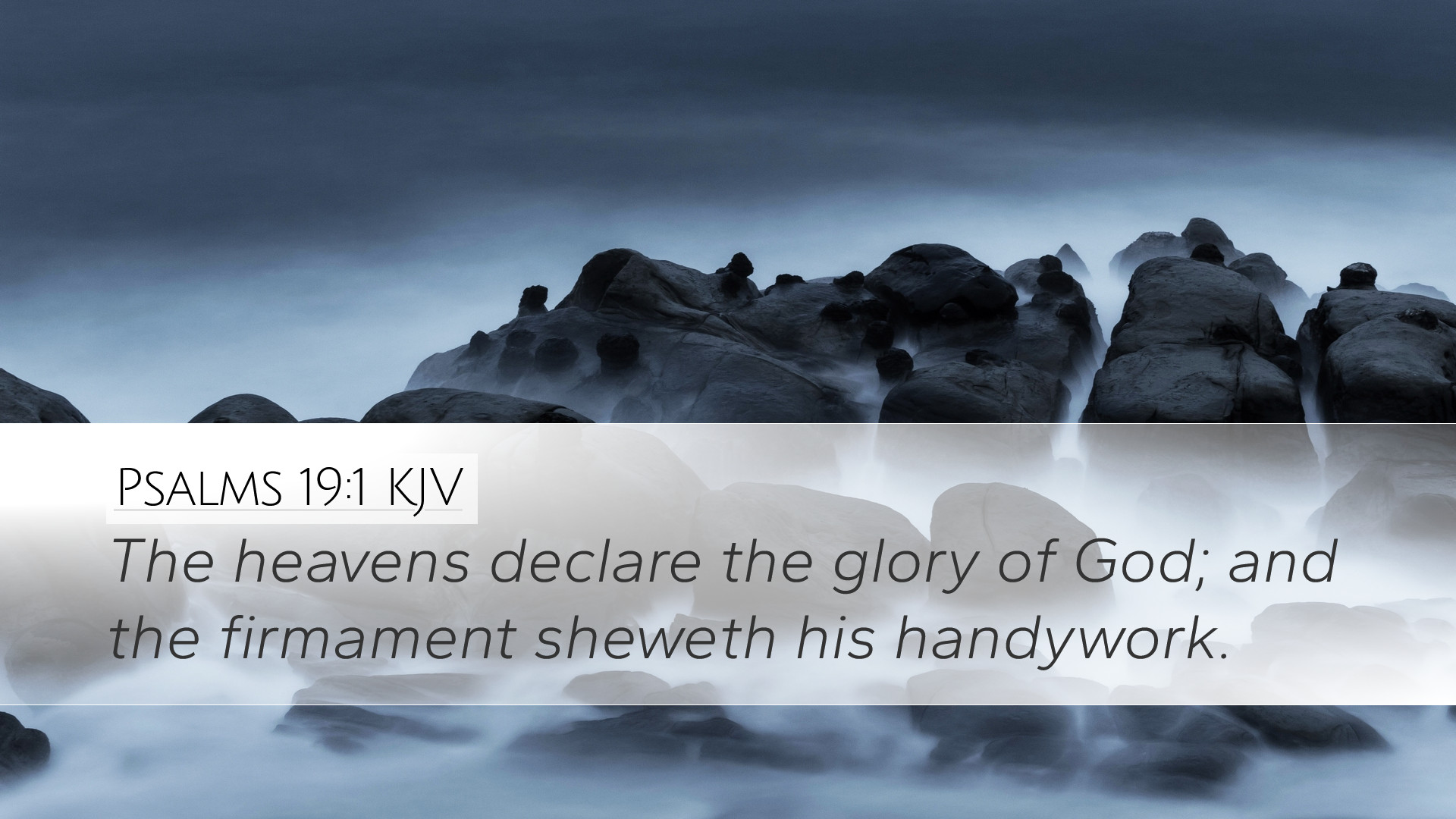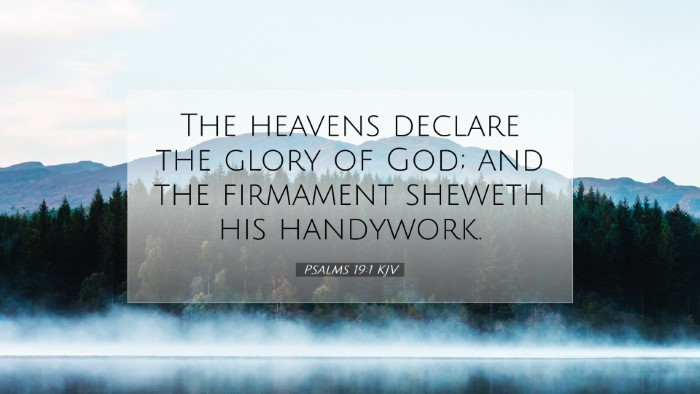Psalms 19:1 - Summary and Commentary
Verse: "The heavens declare the glory of God; and the firmament shows His handiwork."
Introduction
The opening verse of Psalm 19 serves as a powerful proclamation of God's majesty as revealed through creation. This verse sets the stage for a profound theological reflection on the natural world as a testament to the glory and wisdom of the Creator. The commentaries by Matthew Henry, Albert Barnes, and Adam Clarke provide rich insights that deepen our understanding of this scripture.
Heavens Declare the Glory of God
Matthew Henry's Perspective: Henry emphasizes that the heavens, with their vastness, beauty, and order, serve as a canvas displaying the glory of God. He argues that the intricacies of the universe—from the stars to the planetary movements—speak of a divine Creator who is both powerful and wise. According to Henry, every part of creation reflects something of God's attributes, whether it be His power, wisdom, or sovereignty.
Albert Barnes’ Commentary: Barnes notes that the phrase "declare the glory of God" suggests a proclamation—a testimony that is loud and clear. He draws attention to the idea that the heavens are not just a backdrop but an active participant in the revelation of God’s character. The beauty of the sky, the vastness of space, and the brilliance of the stars are all elements that contribute to an understanding of God's glory. It is through these observable phenomena that humanity can glimpse the majesty of God.
Adam Clarke's Insights: Clarke further articulates that every part of the heavens, including the sun, moon, and stars, reflect the glory of their Creator. He discusses how, in ancient cultures, the celestial bodies were often deified, yet the psalmist acknowledges that they serve merely as reflections of the true God. Clarke stresses the significance of recognizing this truth in a world where the created often overshadows the Creator.
The Firmament Shows His Handiwork
Matthew Henry: Building upon the initial declaration, Henry remarks on the firmament—the expansive sky—that showcases God’s creativity. He interprets this as not merely a display but as a reflection of God’s handiwork, indicating intelligence and design. The heavens are a daily reminder of God's artistic brilliance and providential care over creation.
Albert Barnes: Barnes elaborates on the term “firmament,” suggesting it symbolizes the expanse of creation that continually manifests God’s work. Every morning and night, the differences in the sky — colors, clouds, and celestial movements — bear witness to God's design and purpose. This echoes the consistency of God’s faithfulness in sustaining the universe.
Adam Clarke: Clarke notes that the grandeur of the firmament is a source of inspiration and wonder. He argues that the intricacy involved in God's creation invites human contemplation and awe. It reminds believers of their place within a larger narrative woven by God’s design. Clarke calls for an appreciation of the beauty in the firmament as an encouragement towards gratitude and worship.
Theological Implications
This verse holds significant theological implications regarding general revelation. All three commentators assert that nature speaks universally in a language that transcends cultural and linguistic barriers, revealing God’s glory to everyone. Here, Psalm 19:1 acts as a bridge between the world of faith and the observable universe.
- Universal Testimony: The heavens and the firmament make a universal declaration of the Creator, accessible to all people. This offers an important message for evangelism as believers can point to creation as evidence of God’s existence and majesty.
- Inspiration for Worship: The splendor of the heavens should invoke worship. As Henry points out, the more humanity contemplates creation, the more they should be driven to glorify the Creator.
- Call to Stewardship: Recognizing the glory of God in creation implies a responsibility for humanity to care for the earth, respecting its beauty and complexity as God’s handiwork.
Conclusion
Psalms 19:1 transcends its poetic form, inviting profound reflection on God’s nature as revealed through creation. The combined insights from Matthew Henry, Albert Barnes, and Adam Clarke offer a multifaceted understanding of how
creation continuously declares the glory of God and showcases His divine artistry. For pastors, students, theologians, and Bible scholars, this verse serves not only as an affirmation of God's grandeur but challenges each to acknowledge and respond to this divine revelation in their lives and ministries.


